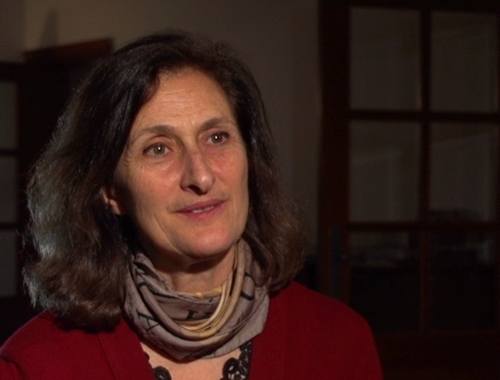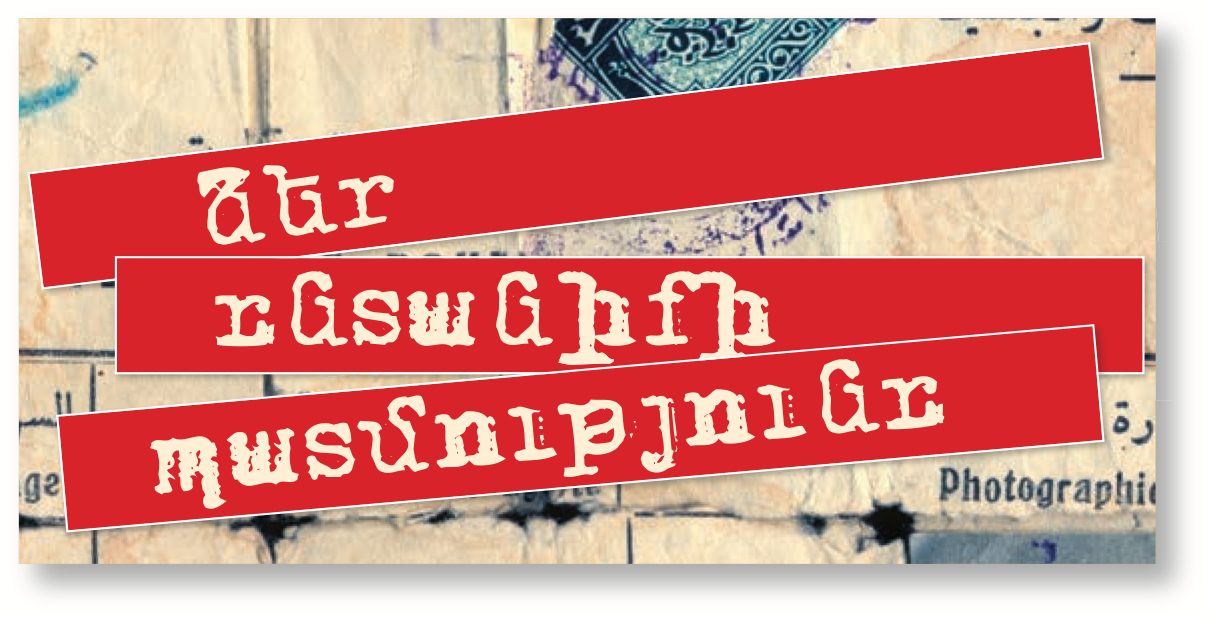 Father immigrated from France in 1947 / Suzanne was born in Armenia
Father immigrated from France in 1947 / Suzanne was born in Armenia
Suzanne Monnot (Der-Mesrobian)
My father fled the 1915 massacres and arrived in France, where he married. He believed in communism and aimed to build communism in the homeland. They went to Armenia in 1947.
They were placed in the village of Berkashat, in the Hoktemberyan district. Later, my father married Hasmik, a local Armenian. My mother’s name is Hasmik. Initially, they rented a small room in Etchmiadzin. My father worked with wood. Then, he taught painting and handicrafts in the Russian school. They gradually settled down and built a house. I was born in Etchmiadzin.
My father’s older sister had married an Armenian from France. They returned to France much quicker since he had a French passport and was a citizen of France. He would always write my father – you return as well; you don’t have to stay. Life was hard.
Everyone knows that raising children during those Soviet years was difficult. Salaries weren’t much. My father’s sister would always prod my father saying – Let’s go. Life ion France is easier. That’s why the family filed to return.
It took eight years before they granted us permission. We arrived in France in 1972. It was a difficult process. My aunt went to the ministry and to the embassy. She even wrote to the president…
I always remember, we were young, they left me, my brother and sister at home. They told us to behave. They went to the passport and visa department (OVIR) in Yerevan. I have memories from childhood of my mother going to OVIR and returned with frayed nerves. I didn’t even know what OVIR was. All I knew was that it was important. Over the years, they would go and file petitions. I remember that father even went to Moscow on several occasions to file papers. He’d always bring tasty food back with him. Once, he brought bananas. There were no bananas in Armenia at the time.
I, and my brother and sister, had our French names. We’d say that I was Arpineh in Armenia and I’d be Suzanne in France. My brother’s name is Hovhannes; Jean in France. Anahit, my sisters, was called Ano in Armenia. We changed it to Ani in France. We had a game we’d play about how we would talk to each other in France. We’d joke about it.
On the way to France, we spent a few days in Moscow. Since mom had sold the house, we had money. We stayed in a luxurious hotel for a few days.
Mother didn’t speak French, nor did we. Since my father was eleven when he came to Armenia, he knew French.
I, a twelve-year-old girl, was placed in the first grade. They were five-year-old children, holding my hand, walking around the school yard. They would say, see, this is a tree. That’s how they taught me French words. I really felt embarrassed.
My mother had it the worst because she lived in a good setting in Etchmiadzin. She had a good circle of friends; the school colleagues of my father. Twice a year, my father would invite his school workers. They’d party and sing all night.
Since they started from scratch in France, they had no money. My mother, seeing how my father was toiling away in the factory, said that she too will work. She worked as a cleaner. One year later, she started to feel bad and said that she could no longer take it. They would argue in the house. Mother would cry. They had health issues and decided to return. They didn’t want to stay. But it wasn’t easy to enter and leave during the Soviet era. It took six years until they could go back.
We had grown up. I was 18 and my sister, 16. My brother was the eldest, 20. He was called to serve in the army in France. He said he would come after being discharged. Three months later, we wrote us a letter saying that he wouldn’t be coming to Armenia. He wanted to get married. He had fallen in love with a blue-eyed blonde French woman.
When my mother heard that her son wouldn’t be coming, she began to wail and cry. “No, I can’t stay here without my boy,” she said. This isn’t probably the only reason. When we returned to Armenia, she had gotten a bit used to the conveniences in France. Whatever. Three months later, we decided not to stay in Armenia.
They had seized our French passports from my father at OVIR. My father went crazy and was angry. It was a big blow. It was alright for me and my sister since we had friends our age. But it was tough for our parents. They were concerned that we too might fall in love.
This struggle lasted for two years. Soviet officials thought we were French spies. In France, they thought we were Soviet spies. We came back here.
I was very sad and wanted to return. I decided to go to Armenia and continue my education. I got accepted at the architecture faculty and applied to enroll. Mother and the rest couldn’t accept it and fought against me going.
Out of the blue, the French police summoned me secretly by telegram. I was a bit scared. I went with my sister. It was an internal affairs official. He said, “We’ve learned that you have applied to return to Armenia.” I said, yes. He asked me if I would like to relay them information from there. Just imagine, me a 21-year-old girl. I was taken aback and started laughing. My sister and I left that place and had a good laugh.
Yep, that official with blue eyes was a cold fish; self-controlled. It was evident that he could hide his emotions quite well. But I observed that he had chewed all his nails down. I figured that the job of a spy, or someone in internal affairs, didn’t have such an easy time of it.
In 1980, no one imagined that the Soviet Union would one day collapse. My husband was a Frenchman, but he really loved Armenians and appreciated their sense of humor and culture. For the past five years, I have taken our children to Armenia every summer, to show them the country.
I remember the first year. I took my boy and girl from the airport and we went to one of the small restaurants at Yerevan’s Cascade. The waiter was a very pleasant boy, with blond hair and blue eyes. The next day, we went to the same place and had a great dolma meal. After leaving my son said, “Mom, when you meet someone in Armenia you basically become friends, right?” He felt the warmth. The kids left with the warmth of that waiter. They loved that behavior of Armenians. Every year, either with me or their father, they happily come to Armenia.
My father, too, found friendship in Armenia. He never had such relationships anywhere else. He criticized the political system, but his best and closest friends were in Armenia.
He had a painter friend, called Hamlet, in Etchmiadzin. He really respected and appreciated his friends. It was a good environment. That’s why he didn’t say that he was a foreigner. Yes, France was his place of birth, but there, he regarded himself only as an Armenia. He would often criticize the French. For example, when my husband would squabble with him a bit, my father would curse him as a Frenchman. My mother, since she was a native from Armenia, probably appreciated France more than my father. I really regret that my father’s health doesn’t permit me to take him once again to Etchmiadzin, to relive his youth a bit.



















